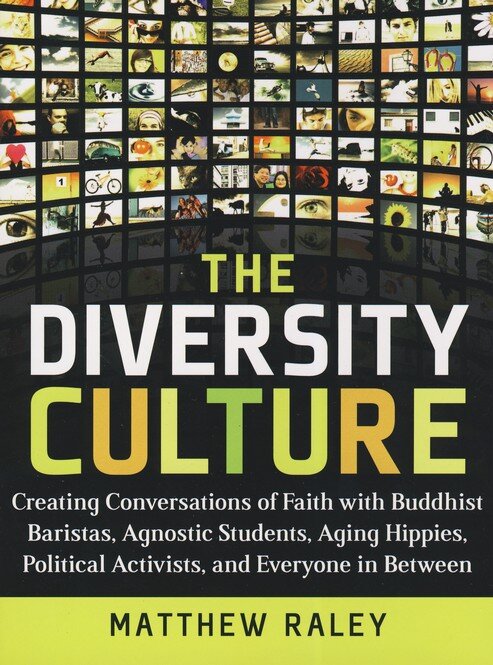Matthew Raley, The Diversity Culture: Creating Conversations of Faith with Buddhist Baristas, Agnostic Students, Aging Hippies, Political Activists, and Everyone in Between. Kregel Academic and Professional, 2009.
Referenced in: Evangelism in Contemporary Culture – Special Challenges
LifeandLeadership.com Summary
This is a deeply evangelical, culturally sensitive look at the sense of marginalization Christians feel in the postmodern environment. Raley strikes against timidity and isolation and encourages Christians to understand and overcome the barriers to meaningful discussion. This is difficult because evangelicals indeed have a subculture – suburban, white, middle class – along with their own media, books, magazines, websites, radio and TV stations. This contrasts to Raley’s description of the “Diversity Culture,” which he defines as “the dominant American ethos of openness toward all beliefs and spiritual traditions.” (13) He further describes it as a culture that is:
Often urban, it thrives just as powerfully in Boulder as in San Francisco. The culture is often highly educated and artistic, embracing the preacher’s daughter who came out as a lesbian, went to Reed College in Portland, and became a visual artist. But it also belongs to the straight, blue-collar guy who, despite never finishing college, does well painting houses in Fresno, the guy whose history is unclear — the salt of the earth, but with a ponytail. While this culture is hostile to America’s vast consumer society, rejecting mass-production aesthetics and corporate values, its adherents have well-tended investment portfolios and are influential in the business world, nurturing such successes as Ben & Jerry’s and Starbucks. Yet Starbucks both appeals to and repels them (which is why our woman supports the independent café rather than hanging out at the chain). Politically the culture is blue: antiwar, environmentalist, pro–gay marriage, secular. But it consistently seeks to preserve local traditions. (12)
The hostilities between the two cultures are indeed real, and cover “disagreements about spirituality, cultural principles, history, politics, and the nature of free society.” (13) And the hostilities are not simply with those outside evangelicalism, but with many younger believers who came of age in the diversity culture. Overcoming the fear, suspicion, contempt, and rejection will not be without difficulty. It will require rethinking of political, socio-economic, and moral viewpoints to distinguish between what is inherently Christian and what is socially constructed.
The model for this is Jesus, who in incidents such as the Samaritan woman in John 4 demonstrates a capacity to overcome barriers. Hence Raley’s purpose: “healing broken relationships as a way of showing Jesus Christ to contemporary America.” (16) This posture was hard-won by Raley himself, who is quite confessional about his own experience in coming to terms with his prejudices and adopting more fair and open postures.
His method in the book is first to represent the diversity culture as honestly as someone outside of it can. His chief resource was researching the “most emailed” articles from the New York Times from 2006-2008 to ascertain what issues the diversity culture really thought about. He then constructs a detailed analogy between the Samaritan-Jewish hostility reflected in John 4 with the evangelical-diversity culture hostilities.
In Part 1, he uncovers the four main barriers that he sees between the two cultures:
- The stereotypical stories of each groups propagated by the media.
- The complexity of mixed signals that make it difficult to categorize people neatly.
- Street postmodernism used by the diversity culture to navigate today’s social ambiguity without getting hur.
- The inabililty of evangelicals to engage people wisely.
In Part 2, he develops a theology for healing broken relationships from John’s gospel. It consists of three main components: the power of scripture, the formation of community vs. autonomy, and conveying a testimony that focuses attention on Jesus Christ. In Part 3, he presents four practical lessons from Jesus’ interactions with the Samaritan woman.
Raley offers a good model for making deep connections without compromising the integrity of the gospel. One Amazon reviewer puts it nicely:
“If you’re looking for a book concerning the philosophical defense of the Gospel or apologetic approaches, The Diversity Culture isn’t it. However, if you’re contemplating how to “create conversations of faith” with your agnostic brother-in-law, transgendered co-worker, bitter ex-Catholic neighbor, or confused teenage daughter, Raley’s book provides a practical, biblical framework for building relationships and engaging in civil, non-judgmental dialog. And as our culture becomes more and more diverse, Christlike listening and engagement will become all the more important.”
From the Publisher
A new culture is emerging-one of spiritual openness, moral flexibility, and social diversity. This diversity culture makes evangelicals uncomfortable, not because they feel threatened, but because they feel excluded. Writing from the perspective of a conservative evangelical, author Matthew Raley tackles the social tensions between evangelicals and the diversity culture. Drawing on analysis of contemporary media, ancient sources, and Scripture, The Diversity Culture examines cultural barriers and how they can be broken, helping Christians understand this cosmopolitan group on their own terms. This incisive and much-needed book gives believers the understanding and tools they need to cross socioeconomic, ethical, and ideological barriers and heal relationships in the name of Christ.
About the Author
Matthew Raley is senior pastor of the Orland Evangelical Free Church in Northern California, where he lives with his wife and two young children.
***For additional information on this resource, including reviews, click the bookstore links. Check the reference at page top or the links below for resource guides on related topics.***
Related Areas
See Other Resources on Evangelism:
See Resources on Over 100 Areas of Ministry Leadership:


